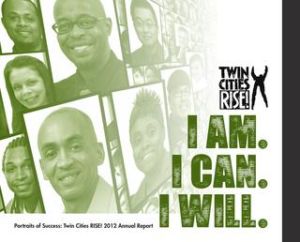The Virtues of Charitable Efforts Syncing with Business Requirements
 Labor Day was a perfect day for the Star Tribune to run pieces about two of the best programs in the Twin Cities aimed at helping low-income men and women gain stronger footholds in the local job market: Twin Cities Rise founded in 1993; and Microgrants founded in 2006. Common to each is respect (goes the adage) for an “honest day’s work,” as well as recognition that their charitable efforts must sync with business requirements if they are to serve on all cylinders.
Labor Day was a perfect day for the Star Tribune to run pieces about two of the best programs in the Twin Cities aimed at helping low-income men and women gain stronger footholds in the local job market: Twin Cities Rise founded in 1993; and Microgrants founded in 2006. Common to each is respect (goes the adage) for an “honest day’s work,” as well as recognition that their charitable efforts must sync with business requirements if they are to serve on all cylinders.
I’ve long appreciated Twin Cities Rise as uncommonly market-based, as that was the vision of Steve Rothschild, who resigned as executive vice president of General Mills to pursue his dream of creating and leading an organization that would help low-income men, particularly of those of color, win jobs that paid at least $15 an hour back then. Rise was to do this by keeping keenly alert to what employers needed. Suffice it to say, its clientele hasn’t been limited to men for a long time.
One of the Star Tribune pieces was a column by business writer Neal St. Anthony headlined “Making Most of a Second Chance” that focused on Davis Powell, an appealing, 34-year old chap who had spent several years in prison but was now successfully self-employed driving people around downtown Minneapolis on a pedicab. Powell, who also works as a Lyft driver, went through “personal-empowerment and skills training at Twin Cities Rise.”
A broader theme in the profile, as well as in a second column/article by St. Anthony, is the need to take greater advantage of ex-offenders, not just for their sake, but also because a hot economy demands them. “As the job market gets tighter,” he writes, “employers are slowly turning to nonprofits such as Rise, Emerge, Building Better Futures, Summit Academy, Genesys Works, Goodwill Easter Seals and others that help former felons build skills and land decent jobs.”
A fair number of people are doubtless not at peace with the idea of sizably more ex-offenders, especially ex-felons, populating the workforce, whether they graduate a solid program like Twin Cities Rise or not. Understood. Yet it’s far from a new idea that it’s in the best interests of everyone that people who have a particularly hard time getting jobs get them. What is new is that we currently have more unfilled jobs than men and women looking for them, and except for occasional downturns, this likely will be the case for a long while.
This last economic fact of life is doubtless disorienting to millions over the years who have had miserable times finding jobs only to get laid off if and when they scored one. But this is the new reality, one in which we need more skilled hands than immediately or imminently available.
As for MicroGrants, its mission is helping “people of promise” get ahead in various ways, one of which is helping them start and operate very small businesses that sometimes grow considerably larger. I know of no organization that is as simultaneously attractive to donors animated by liberal compassion, and those, more likely on the right, enthused by its respect for the market. Apologies for the stereotyping, but you get the idea.
I’m happy to disclose that I served on MicroGrants’ board of directors for several years earlier this decade, working with founder Joe Selvaggio and executive director Don Samuels. Their op-ed in Monday’s Strib argued that “wealthy individuals, foundations, and donor-advised funds to consider giving a larger amount now to effective nonprofits than their usual 2 to 5 percent annually.”
Fine, not that I’m entirely comfortable when they also talk about a “few” foundations, donor-advised funds, and “wealthy individuals” liquidating their holdings, or giving 10 percent rather than 5 percent of assets on a yearly basis, so that “many more billions of dollars annually could go into communities, making the body politic well today, rather than reducing its symptoms into the future.” As the George Bush the Elder might put it, that doesn’t sound terribly “prudent.”
Then, again, H.W. might rekindle a few “Points of Light” when Joe and Don, a second later, urge “business people who were smart enough to make the money” to “‘enjoy the fruits of their giving while they are living.”